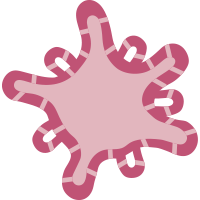
Organoid News
Organoid News is an online resource dedicated to the latest research about and featuring organoids.
High-Fat Diet Enhances Cell Proliferation and Compromises Intestinal Permeability in a Translational Canine Intestinal Organoid Model
[BMC Molecular And Cell Biology] Investigators assessed the multifaceted interactions between palmitic acid, cell proliferation, and the intestinal epithelial barrier using a canine colonoid model. Canine models, due to their relevance in simulating human intestinal diseases, offer a unique platform to explore the molecular mechanisms underlying high-fat diet-derived intestinal dysfunction.
Hyaluronan Improves Photoreceptor Differentiation and Maturation in Human Retinal Organoids
[Acta Biomaterialia] Scientists investigated the addition of hyaluronan, a component of the interphotoreceptor matrix, as an additive to promote long-term organoid survival and enhance retinal maturation.
Sebaceous Gland Organoid Engineering
[Burns & Trauma] The authors provide an overview of recent advancements in sebaceous glands (SG) organoid engineering. It highlights some potential strategies for SG organoid functionalization that were promising to forge a platform for engineering vascularized, innervated, immune-interactive and lipogenic SG organoids.
Quantifying Y Chromosome Loss in Primary and Metastatic Prostate Cancer by Chromosome Painting
Researchers developed a system to quantify Y chromosome gain or loss in patient-derived prostate cancer organoids. Using this system, they observed Y chromosome loss...
Vitamin D Opposes Multilineage Cell Differentiation Induced by Notch Inhibition and BMP4 Pathway Activation in Human Colon Organoids
[Cell Death & Disease] Investigators reported a differentiation system toward enterocytes and goblet cells, the two major colonic epithelial cell lineages, using colon organoids generated from healthy tissue of colorectal cancer patients.
Identification of Genes that Promote PI3K Pathway Activation and Prostate Tumour Formation
[Oncogene] Using prostate organoid models, scientists showed that either Bzw2 downregulation or EIF5A2 overexpression leads to increased organoid size and in vivo prostate growth.
In Utero and Postnatal Ivacaftor/Lumacaftor Therapy Rescues Multiorgan Disease in CFTR-F508del Ferrets
[JCI Insight] Using primary intestinal organoids and air-liquid interface cultures of airway epithelia, scientists demonstrated that the F508del mutation in ferret CF transmembrane conductance regulator (CFTR) results in a severe folding and trafficking defect, which could be partially restored by treatment with CFTR modulators.
SF3B3-Regulated mTOR Alternative Splicing Promotes Colorectal Cancer Progression and Metastasis
[Journal Of Experimental & Clinical Cancer Research] Colorectal cancer (CRC) cell xenografts, patient-derived xenografts, patient-derived organoids, and orthotopic metastasis mouse models were utilized to determine the in vivo role of SF3B3 in CRC progression and metastasis.
Modeling Acute Myocardial Infarction and Cardiac Fibrosis Using Human Induced Pluripotent Stem Cell-Derived Multi-Cellular Heart Organoids
[Cell Death & Disease] Scientists generated self-organizing heart organoids using human-induced pluripotent stem cells. These organoids consisted of cardiomyocytes, fibroblasts, and endothelial cells, mimicking the cellular composition of the human heart.
Induced Pluripotent Stem Cells (iPSCs): Molecular Mechanisms of Induction and Applications
[Signal Transduction And Targeted Therapy] The authors outline key developments in the induced pluripotent stem cell (iPSC) field and highlight the immense versatility of the iPSC technology for in vitro modeling and therapeutic applications.
New TEC Organoid Model to Study Thymus Function
[Drug Target Review] Scientists at the Organoid group have developed a new organoid model derived from thymic epithelial cells (TECs) that can be used to study the thymus. This is the first laboratory model that enables long-term culture of TECs, presenting new opportunities to study their function.
Patient-Derived Organoids of Pancreatic Ductal Adenocarcinoma for Subtype Determination and Clinical Outcome Prediction
[Journal Of Gastroenterology] Researchers established patient-derived organoids for pancreatic ductal adenocarcinoma and evaluated their application in subtype classification and clinical outcome prediction.
Organoids are three-dimensional cell cultures that more accurately model cell behavior, organ function, and pathology than traditional two-dimensional cell culture. Organoid News was launched in 2020 to help scientists stay up-to-date with this revolutionary new research system. Use Organoid News to stay current with the latest applications and discoveries using organoids, as well as new reviews, jobs, news, and upcoming events.

 Cancer Stem Cell News
Cancer Stem Cell News Cell Therapy News
Cell Therapy News Dermal Cell News
Dermal Cell News Endothelial Cell News
Endothelial Cell News ESC & iPSC News
ESC & iPSC News Extracellular Matrix News
Extracellular Matrix News Hematopoiesis News
Hematopoiesis News Hepatic Cell News
Hepatic Cell News Human Immunology News
Human Immunology News Immune Regulation News
Immune Regulation News
 Intestinal Cell News
Intestinal Cell News Mammary Cell News
Mammary Cell News Mesenchymal Cell News
Mesenchymal Cell News Muscle Cell News
Muscle Cell News Neural Cell News
Neural Cell News Organoid News
Organoid News Pancreatic Cell News
Pancreatic Cell News Prostate Cell News
Prostate Cell News Pulmonary Cell News
Pulmonary Cell News
